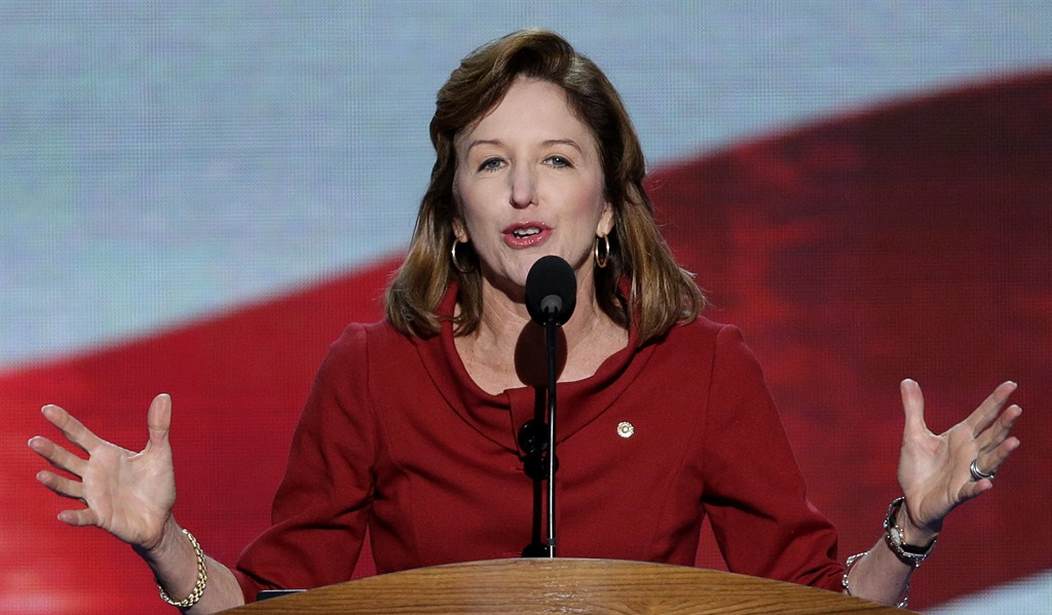The Republican National Committee released their new ad for North Carolina’s Senate race in their “Road To Six” campaign. The spot slams Sen. Kay Hagan as nothing more than a vote for the Obama agenda. It cited how she votes with the president 95 percent of the time, despite slamming her predecessor Sen. Elizabeth Dole for voting with then-President Bush 92 percent of the time. She remarked that Dole hasn’t done much in the Senate, but in six years; the RNC claims she has yet to introduce a bill that has become law.
The RNC Chairman said:
I find it ironic that in 2008 Kay Hagan campaigned on the idea that North Carolinians don’t approve of voting with the president all of the time. Clearly, Senator Hagan does not practice what she preaches: she has voted with President Obama 95 percent of the time…Kay Hagan has never introduced a bill that became law and does not chair any of the Senate full committees. In other words, she’s just a rubber stamp for the Obama agenda. For these reasons, and many more, North Carolina can’t afford to have Kay Hagan in the Senate for six more years, and that is why come November, North Carolina will ‘Stop Obama, Fire Reid, and Defeat Hagan.’”
At the same time, the National Republican Senatorial Committee released this ad, which cited the ineffectiveness of Hagan as a senator and her lack of accomplishments. As a result, she has not earned re-election.
Meanwhile, former President Bill Clinton stopped by North Carolina last Tuesday to attend a fundraiser for Sen. Hagan. Last week, the Democratic senator, who is leading in the polls, told a group of supporters that they will be “kicking Tillis out,” but that may be a bit premature.
As the 2014 election cycle has become more concerned about ISIS and terrorism, the focus of the debate leans in the Republicans’ court; the GOP is way ahead of Democrats concerning who voters trust on national security. The Tillis campaign has already hit Hagan for missing classified ISIS hearings last February.
Tillis has a major deficit with women voters–and was getting hammered for reportedly overseeing $500 million in cuts to education in the state legislature. It’s a claim that’s been labeled as half true.
Recommended
The shift in national security matters gives Tillis, who still has room to grow, a buffer from the onslaught in ads from Democrats over education and opens a new GOP-friendly front in this highly contested senate race. Also, harping on his working class family upbringing helps tap into the neo-populist sentiment that's starting to gain traction with voters; they like candidates who are authentic, seen as approachable, and have experienced and triumphed over financial struggle.
Hagan’s campaign narrative also could be in peril. I’ve mentioned in previous posts about Hagan’s “sins of Raleigh” strategy, which was aptly noted by a North Carolina GOP strategist; where Hagan is trying to make the the state legislature more unpopular than Capitol Hill. After all, Tillis is the State House Speaker and unpopular, right?
The truth is there are very few polls that asked about Mr. Tillis directly. The CNN poll did, as did the Civitas Institute. While a previous Civitas Institute poll had Tillis coming in with poor favorable/unfavorable numbers, there was also a substantial amount of voters who didn’t have an opinion. The CNN poll found that he has made considerable improvements, with 47 percent of North Carolina voters viewing him favorably and 47 to 40 unfavorably. Here’s the "nugget" (via NYT):
If there were more surveys showing Mr. Tillis as unpopular as the conventional view, then perhaps we could discount the CNN/ORC poll as an outlier. But in the absence of more evidence to the contrary, one should at least be open to the possibility that Mr. Tillis is more popular than was thought.That opens the door to a different view of the race: that Mr. Tillis is poised to narrow or eliminate Ms. Hagan’s lead behind undecided voters who view him favorably and who view Ms. Hagan and President Obama unfavorably.
Mr. Tillis might also benefit from the inevitable decline in the support of Sean Haugh, a libertarian candidate who attracted 7 percent of the vote in the CNN/ORC poll.
David Freddoso also wrote that:
In RCP’s poll average, Hagan has dropped from a 4-point lead to 3 points in just one week. And while that a small drop, it demonstrates that despite that $27 million has already been in the race, she has been unable to extend the lead beyond the margin of error.As many analysts have predicted as well, should the turnout among Republican voters be as high as expected, Hagan could be defeated anyway.
Finally, we have NC Spin, which describes itself as “balanced debate in the Old North State,” posting this post from John Davis, a 20+ year veteran in North Carolina politics, who lists his reasons why Tillis is poised to upset Hagan:
MIDTERM TURNOUT: Since 1992, the average midterm election year turnout is about 22 points lower than presidential election years. In 2008, statewide turnout in the North Carolina General Election was 70%. In 2010, statewide General Election turnout was 43.8%.…
EARLY VOTING TURNOUT: When you take a look at the early voting turnout in 2008, the presidential election year in which Hagan won, as compared to the 2010 midterm election year, you can readily see that Hagan’s biggest challenge is yet to come.
In 2008, when Hagan won, 48% of all registered Democrats voted early; 52% of all registered African-American voters voted early
In 2010, a midterm election year, only 16.1% of all registered Democrats voted early; only 14.9% of all registered African-Americans voted early
STRAIGHT PARTY VOTERS: You see a similar shift in the partisan advantage of straight party voters from presidential election years to midterm election years.
In 2008, 1,283,486. Democrats voted straight party; 59% of all straight party voters
In 2010, 599,985, Democrats voted straight party; 51% of all straight party voters
NEW ELECTION LAWS: The elimination of straight party voting is one of the new election laws passed by the Republican General Assembly scheduled to take effect this fall. Today, September 25, 2014, a three-judge federal panel is convening in Charlotte to hear arguments on whether enforcement of the new election laws should be delayed.
If the three-judge panel rules next week that the new election laws can stand, Democrats will face an even tougher turnout challenge. Under the new rules, early voting days are reduced from 17 to 10. There will be no same-day registrations and no straight party voting.
TURNOUT OPERATIONS: In 2012, the Obama camp in Chicago invested $100 million during the 18 months before Election Day in a digital voter contact and turnout operation called Narwhal. They defied the odds and turned out African-Americans and young voters in key swing states in numbers even higher than their historic 2008 accomplishments. That’s why Obama won.
Meanwhile, in Boston, the Romney camp invested an inadequate amount of resources in a digital voter contact and turnout operation called Orca. Orca crashed on Election Day.
Following the loss of the presidential race of 2012, RNC Chairman Reince Priebus directed a self-assessment that became a scathing critique titled the Growth & Opportunity Project. Republicans were their own worst critics on matters like communications with minorities and women and mobilizing voters through digital communications. They were determined to improve.
Democrats laughed at Republicans for admitting their weaknesses in their communication with women and minorities. If my January 10 conclusions are on target, and if Republicans do neutralize the Democrats’ digital voter turnout advantage, then Democrats won’t be laughing on Election Day.
There is a little bit of a wrinkle about the election law; parts of it have been blocked (via Time):
A federal appeals court on Wednesday blocked parts of a sweeping North Carolina voting law from taking hold ahead of this year’s midterm elections.The Fourth Circuit Court of Appeals reversed a lower court’s decision to allow provisions of the law that eliminate same-day-registration and the casting of out-of-precinct ballots. The appeals court on Wednesday still allowed other portions of the law to stand, including the cut of seven early voting days. But in a 69-page opinion Wednesday, the appeals court said an August decision by the lower district court to allow the full law was flawed.
The decision comes just weeks before the early voting period is set to begin in the Tar Heel State on Oct. 23. “The right to vote is fundamental,” Judge James Wynn wrote in the majority opinion. “And a tight timeframe before an election does not diminish that right.”
UPDATE: Hagan campaign already took the opportunity to slam Tillis post-election law ruling. Is she trying to rally the base and boost Democratic turnout? You betcha.
RT @DanielStrauss4 Hagan campaign quick to use this NC Voting Law news against Thom Tillis. pic.twitter.com/i0oOgfJuEZ
— Josh Kraushaar (@HotlineJosh) October 1, 2014

























Join the conversation as a VIP Member